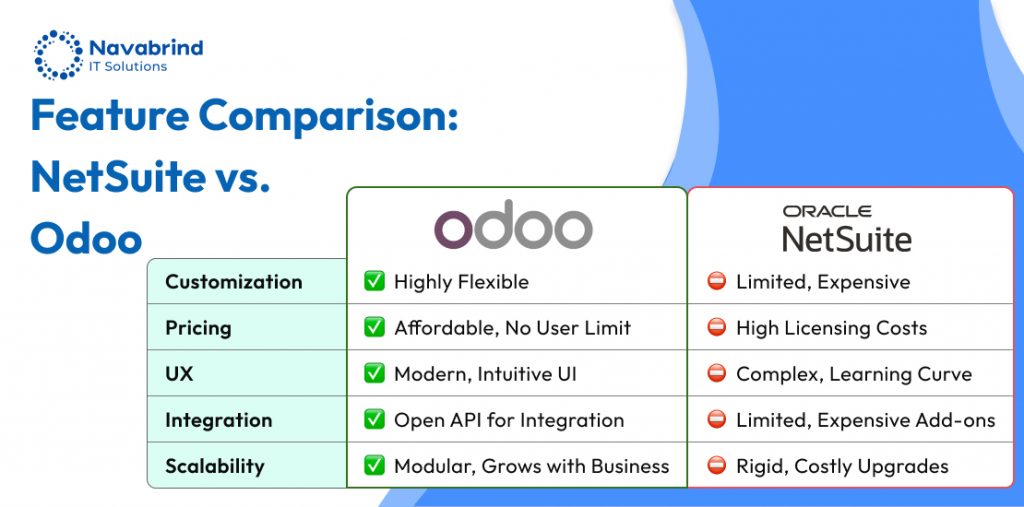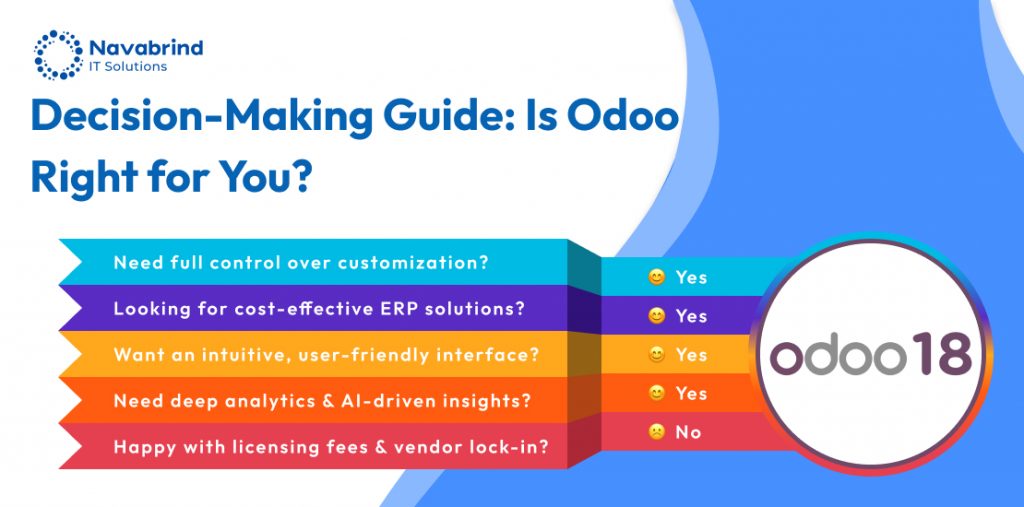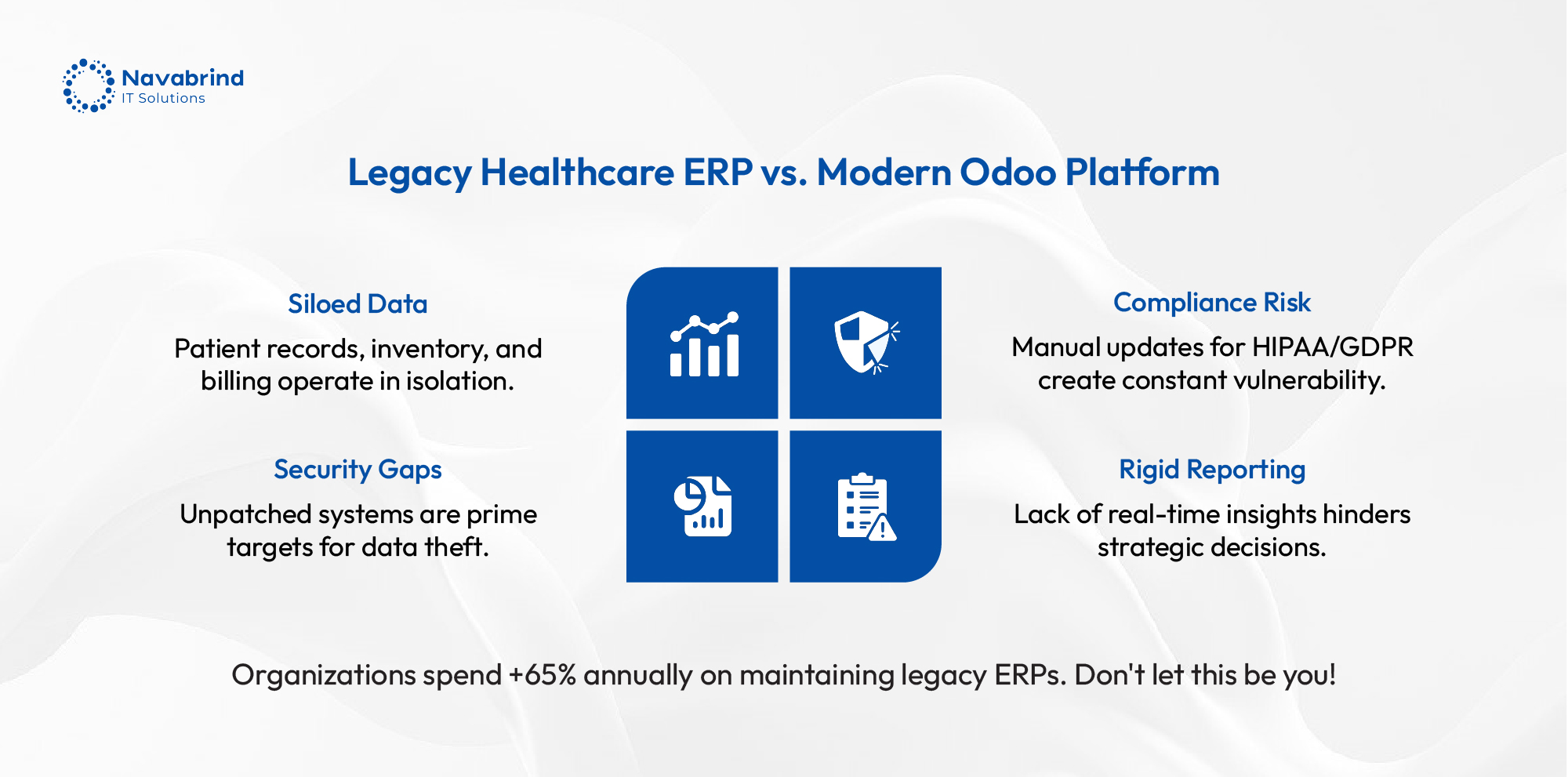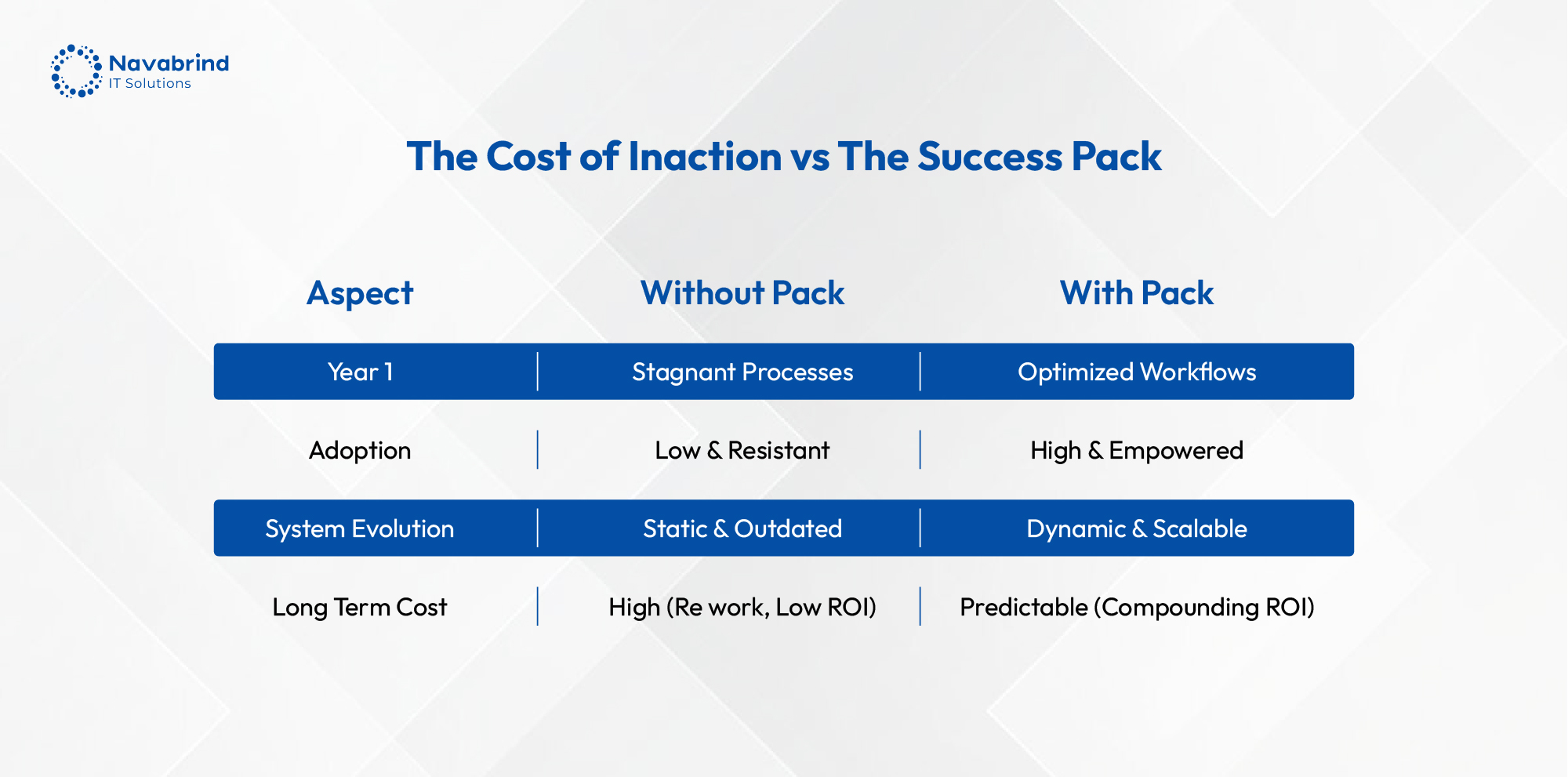NetSuite vs. Odoo: Which ERP Solution is Right for Your Business?
- February 20, 2025
- Posted by: Vasanth Anantharaman
- Categories: Blog, ERP Migration, Odoo
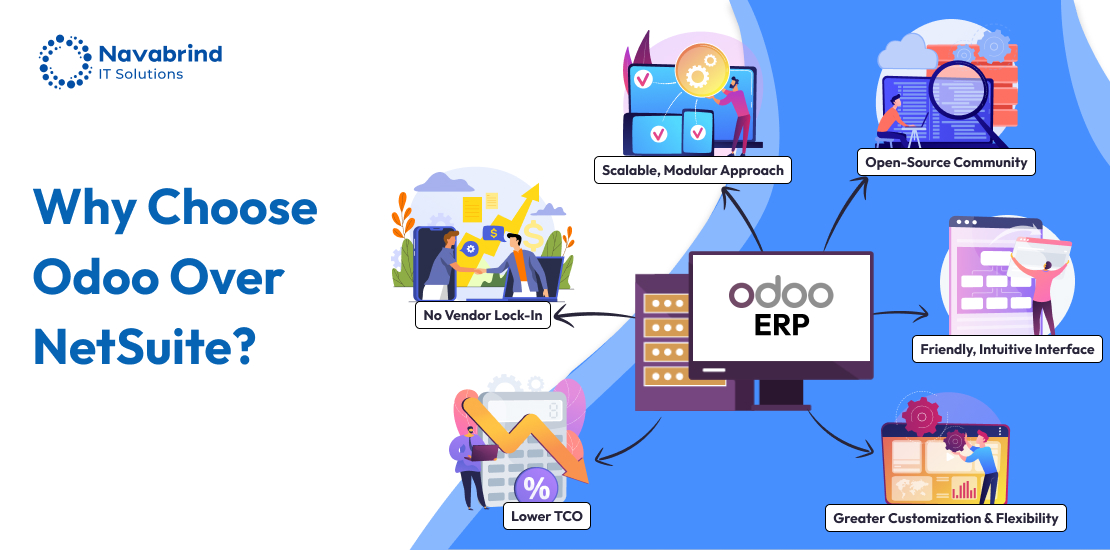
Oracle NetSuite to Odoo migration is a strategic move for businesses seeking greater flexibility, cost-efficiency, and a user-friendly ERP experience. While NetSuite offers a cloud-based solution, many companies find its high subscription costs, rigid pricing structure, and complex customization process to be limiting. NetSuite ERP integration can be cumbersome, requiring extensive technical expertise and expensive third-party solutions. Customizations often require specialized coding expertise, leading to higher implementation costs and longer deployment times.
Odoo ERP solutions provide an affordable, modular, and customizable alternative, allowing businesses to scale without being locked into costly long-term contracts. Odoo 18 ERP migration ensures that companies benefit from a modern interface, robust functionality, and a thriving community-driven development model.
With Odoo 18 ERP migration, businesses can experience a seamless ERP migration from NetSuite to Odoo, leveraging intuitive, drag-and-drop customizations, open-source integrations, and a cost-effective pricing model. Odoo ERP integration simplifies connections with third-party applications, eliminating the complexities associated with NetSuite ERP Integration. For organizations looking for an agile, scalable, and budget-friendly ERP system migration, Oracle NetSuite to Odoo migration presents a compelling opportunity to optimize operations while reducing overhead costs.
Why Engage in an Oracle NetSuite to Odoo Migration?
The Limitations of NetSuite ERP Integration
While NetSuite ERP integration has been a go-to solution for many enterprises, it comes with its fair share of challenges. One of the most significant drawbacks is its high cost, which includes not only licensing fees but also ongoing maintenance and customization expenses. For small and mid-sized businesses, these costs are prohibitive.
NetSuite’s complexity requires specialized training and dedicated IT resources, making it less accessible for teams without technical expertise. Its rigidity is another pain point, as businesses often find it difficult to customize.
The Benefits of Odoo ERP Solutions
In contrast, Odoo ERP solutions offer a cost-effective and user-friendly alternative. Odoo’s modular design allows businesses to start with the features they need and add more as they grow and reducing upfront costs. Its intuitive interface makes it easier for employees to adopt.
Moreover, Odoo’s flexibility is unmatched. Businesses can customize the ERP to align with their specific workflows and integrate it with third-party applications.
Future-Proofing Your Business with Odoo 18 ERP Migration
With advanced features like enhanced reporting, AI-driven insights, and improved mobile functionality, Odoo 18 ERP migration ensures your business is equipped to handle future challenges. Its scalability allows you to expand operations without outgrowing the system.
With a Oracle NetSuite to Odoo migration, you’re not just upgrading your ERP system—you’re investing in a platform that grows with your business.
Key Considerations Before Migration
An Oracle NetSuite to Odoo ERP migration requires careful planning. The first step is to assess your current NetSuite ERP setup and identify pain points that hinder efficiency. Businesses often face challenges such as high integration costs, rigid workflows, and limited customization options in NetSuite. Evaluating these limitations helps in understanding how Odoo ERP solutions can better align with operational needs. Reviewing existing data structures, integrations, and third-party applications is crucial for ensuring a seamless ERP migration from NetSuite to Odoo without disrupting business operations.
Once the assessment is complete, it’s essential to define your business goals and how an Odoo ERP integration can support them. Whether the focus is on cost reduction, better scalability, or improved automation, Odoo 18 ERP migration provides businesses with a flexible and modular system tailored to their needs. During the migration, data integrity must be prioritized—this includes cleansing, mapping, and securely transferring data to ensure accuracy in financial records, customer information, and operational workflows. Customization requirements should also be considered, as businesses may need specific modules or workflows adapted to match their current operations. Lastly, user training plays a vital role in successful adoption. Employees accustomed to NetSuite may require hands-on training and support to leverage Odoo’s intuitive interface and advanced functionalities effectively.
A well-structured ERP system migration plan, supported by ERP migration services, ensures minimal downtime and maximizes the benefits of Odoo ERP solutions. Partnering with experienced professionals like Navabrind IT Solutions can help in addressing technical complexities and optimizing the system for long-term efficiency. Oracle NetSuite to Odoo migration is not just a software shift—it’s a strategic move toward better performance, adaptability, and cost-effectiveness.
Step-by-Step Guide on How to Migrate from Oracle NetSuite to Odoo
Oracle NetSuite to Odoo migration requires a structured approach to ensure minimal business disruption. By following a step-by-step ERP system migration process, businesses can successfully transition to Odoo ERP solutions while maintaining data integrity, optimizing workflows, and ensuring easy adoption.
- Pre-Migration Planning
The foundation of a successful Oracle NetSuite to Odoo migration is careful planning. Businesses should start by evaluating their existing data and workflows, identifying inefficiencies, and defining objectives for migration. Understanding which Odoo ERP integration modules align best with business requirements helps in streamlining processes and avoiding unnecessary complexity. Selecting a reliable ERP migration services provider ensures expert guidance throughout the process.
- Data Migration
Data migration involves extracting valuable business information from NetSuite ERP integration systems. Before transferring data, it must be cleaned and mapped to match Odoo’s structure, ensuring compatibility and eliminating redundant or outdated records. Conducting a test migration is essential to identify discrepancies, validate data accuracy, and make necessary corrections before the full transition.
- Customization and Integration
Each business has unique operational needs, and Odoo ERP solutions provide flexibility through customization. During migration, companies can customize Odoo ERP functionalities to align with their workflows and optimize processes. Integrating third-party applications, such as payment gateways, CRMs, and marketing tools, ensures an Oracle Netsuite to Odoo migration without disrupting daily operations.
- Testing and Validation
Once the data has been migrated and customizations are in place, thorough testing is crucial. Businesses must validate data accuracy, check system functionality, and test workflows to ensure Odoo is configured correctly. Role-based user access should be tested to confirm that employees have the necessary permissions. Identifying and resolving issues at this stage prevents complications post-migration.
- Go-Live and Post-Migration Support
The final step in the Odoo 18 ERP migration process is executing the go-live phase with minimal downtime. To ensure a smooth transition, employees must be trained on Odoo’s interface and features. Even after the system is live, ongoing post-migration support is essential to address unexpected challenges, optimize performance, and make necessary refinements. Partnering with experienced ERP system migration professionals like Odoo Gold Partner, Navabrind IT Solutions ensures continuous assistance, helping businesses maximize the benefits of their Odoo ERP solutions.
A well-executed Oracle NetSuite to Odoo migration enhances business efficiency, reduces costs, and unlocks Odoo’s advanced capabilities. By following these structured steps, businesses can achieve a Oracle Netsuite to Odoo migration, positioning themselves for long-term success in an increasingly digital world.
Benefits of a Migrating from NetSuite to Odoo 18 ERP
How to migrate from Oracle NetSuite to Odoo and the benefits of migrating from NetSuite to Odoo ERP are questions that bothers many users. A well-planned ERP system migration enables businesses to leverage Odoo ERP solutions to drive efficiency, reduce costs, and improve overall productivity.
- Improved Operational Efficiency and Cost Reduction
One of the primary benefits of Odoo migration is streamlined operations. Unlike NetSuite, which often requires expensive add-ons, Odoo provides a unified platform with fully integrated applications. This eliminates the need for multiple third-party tools, reducing NetSuite ERP migration costs and minimizing licensing expenses.
- Enhanced Scalability and Flexibility
Businesses evolve, and so should their ERP system. Odoo ERP integration offers unmatched scalability, allowing companies to add new modules as they grow, without being locked into rigid pricing structures. Whether expanding operations, adding new departments, or integrating third-party applications, Odoo’s modular approach ensures that businesses can scale efficiently while keeping costs under control.
- Better User Experience and Increased Productivity
A modern, user-friendly interface is crucial for employee adoption and productivity. Odoo ERP solutions offer an intuitive design with customizable dashboards, drag-and-drop functionality, and smooth navigation. Compared to NetSuite’s more complex UI, Odoo’s simplicity ensures that teams can quickly adapt, minimizing training time and maximizing output.
Future-Ready Technology with Odoo 18 ERP Migration
Technology is evolving, and businesses need an ERP that keeps pace with innovation. Odoo 18 ERP migration brings AI-powered automation, improved mobile accessibility, and enhanced security features, ensuring that businesses stay ahead of the competition. Unlike NetSuite, which may require extensive custom coding for updates, Odoo’s open-source architecture makes future upgrades cost-effective.
Choosing the Right ERP Migration Services Provider
Wondering how to migrate from Oracle NetSuite to Odoo ERP? A successful transition requires expert guidance and a well-structured approach. Choosing the right ERP migration services provider is crucial to ensure an Oracle NetSuite to Odoo migration without unnecessary delays, data loss, or operational disruptions.
- Expertise in NetSuite to Odoo Migration
Migrating from NetSuite to Odoo involves complex processes such as data extraction, system reconfiguration, and workflow optimization. An experienced Odoo ERP integration partner will understand the nuances of both systems, ensuring a smooth transition. They should be proficient in handling ERP system migration, including Odoo 18 ERP migration, customization, and third-party integrations.
- Key Qualities to Look for in an Oracle NetSuite to Odoo Migration Partner
When selecting a ERP migration services provider, businesses should consider:
- Proven Experience – A track record of successful Odoo ERP implementation projects.
- Technical Expertise – In-depth knowledge of Odoo migration, database management, and system architecture.
- Customization Capabilities – Ability to tailor Odoo to meet specific business needs.
- Strong Customer Support – Ongoing assistance to address challenges before, during, and after migration.
- Tips for Ensuring a Smooth Migration Process
To achieve a smooth Oracle NetSuite to Odoo migration, businesses should:
- Conduct a detailed assessment of their current NetSuite setup.
- Define clear business objectives for migrating to Odoo ERP solutions.
- Work with an experienced ERP migration services provider for data validation and system optimization.
- Ensure comprehensive user training to maximize Odoo adoption.
- Plan for post-migration support to resolve potential challenges and optimize system performance.
By choosing the right ERP migration services provider and following best practices, businesses can successfully transition from NetSuite to Odoo.
Frequently Asked Questions
1. How to Migrate from Oracle NetSuite to Odoo ERP?
Most ERP users are deeply concerned about how to migrate from Oracle NetSuite to Odoo ERP, thankfully this is well charted territory. The process begins with a comprehensive assessment of your existing NetSuite ERP system, identifying critical business processes, data structures, and customizations that need to be replicated in Odoo. The next step is data extraction and cleansing, ensuring that redundant, outdated, or incorrect data is removed before migration. With Odoo ERP integration, businesses can map their NetSuite workflows to corresponding Odoo modules, customizing them for optimal functionality.
A successful Odoo 18 ERP migration also involves testing and validation, where businesses ensure that all essential data, transactions, and workflows function correctly in the new system. NetSuite ERP migration often involves third-party tools that can be replaced with Odoo’s native applications, reducing costs and improving efficiency. Once the system is live, organizations should focus on training employees and providing post-migration support to ensure a smooth adaptation. Partnering with an experienced Odoo Migration provider ensures that businesses undergo a Oracle NetSuite to Odoo migration with minimal risks and maximum benefits.
2. What are the Benefits of Migrating from NetSuite to Odoo ERP?
Oracle NetSuite to Odoo migration brings multiple advantages, particularly for businesses looking for cost-effective, customizable, and scalable ERP solutions. One of the biggest pain points of NetSuite is its expensive subscription fees and complex pricing models, which often make it difficult for small and mid-sized businesses to sustain long-term operations. With Odoo ERP solutions, businesses can enjoy a modular, open-source platform that allows them to pay only for the features they need, significantly reducing ERP ownership costs. Odoo 18 ERP migration enables organizations to streamline their processes with easy-to-use, highly customizable, and fully integrated applications across finance, sales, CRM, inventory, and HR.
A key benefit of Oracle NetSuite to Odoo migration is the ease of customization and integration. Unlike NetSuite ERP Integration, which often requires third-party connectors and custom development, Odoo ERP integration offers native applications and open-source adaptability, enabling businesses to integrate smoothly with their existing software ecosystem. The transition also brings improved flexibility, faster deployment, and better control over ERP functionalities, making Odoo ERP solutions the preferred choice for businesses seeking Oracle NetSuite to Odoo migration.
3.What is the List of Odoo ERP Migration Services for NetSuite Users?
An Oracle NetSuite to Odoo ERP migration requires specialized migration services to ensure a smooth transition. Some of the core Odoo ERP migration services include data migration, which involves extracting, cleaning, and transferring business-critical data such as customer records, financial transactions, and inventory details. System mapping and customization ensure that the workflows, permissions, and functionalities from NetSuite are replicated or optimized within Odoo ERP solutions to enhance operational efficiency.
Beyond migration, businesses benefit from Odoo ERP migration services, ensuring a connection with third-party tools, payment gateways, and analytics platforms. Post-migration support and optimization are also crucial, as businesses need ongoing monitoring, troubleshooting, and performance enhancements to maximize the value of their Odoo 18 ERP migration. With expert Odoo migration services, businesses can achieve a Oracle NetSuite to Odoo migration, eliminating NetSuite’s limitations while leveraging Odoo ERP integration for enhanced scalability, automation, and cost efficiency.
4. What are the common challenges faced during Oracle NetSuite to Odoo ERP migration?
Oracle NetSuite to Odoo ERP migration involves several challenges that require careful planning and execution. One primary challenge is data migration, which includes extracting, cleansing, and accurately mapping data from NetSuite to Odoo’s structure. To mitigate this, it’s essential to conduct a thorough data audit to identify critical information and potential inconsistencies. Utilizing specialized data migration tools and working with experienced professionals can ensure data integrity during the transition.
Another challenge is the alignment of business processes. NetSuite and Odoo may handle workflows differently, necessitating adjustments to fit Odoo’s framework. Engaging in comprehensive business process mapping helps in understanding these differences and configuring Odoo to meet specific organizational needs. User training is crucial, as employees accustomed to NetSuite will need guidance to adapt to Odoo’s interface and functionalities. Providing adequate training sessions and support resources can facilitate a smoother transition and enhance user adoption.
5.How does the cost of ownership compare between Oracle NetSuite and Odoo ERP?
The Total Cost of Ownership (TCO) is a significant consideration when evaluating ERP systems. Oracle NetSuite operates on a subscription-based model, often involving substantial licensing fees, recurring costs, and additional charges for customizations and integrations. These expenses can accumulate over time, especially for small to medium-sized enterprises.
In contrast, Odoo ERP solutions offer a more cost-effective alternative. As an open-source platform, Odoo eliminates hefty licensing fees, allowing businesses to invest in customization and scalability according to their needs. Its modular pricing structure enables companies to pay only for the functionalities they require, reducing unnecessary expenditures. Moreover, the flexibility to choose between on-premise and cloud hosting provides more avenues for cost savings, making Odoo a financially advantageous choice for many organizations.
6. Can Odoo ERP integrate with existing third-party applications used in my business?
Yes, Odoo ERP integration is designed to be highly adaptable, allowing connectivity with a wide range of third-party applications. Whether your business utilizes tools for e-commerce, customer relationship management, accounting, or other specialized functions, Odoo’s open API architecture facilitates smooth integration.
This capability ensures that businesses can maintain their existing workflows and data consistency across platforms. The extensive community and partner network supporting Odoo continuously develop new modules and connectors, expanding the possibilities for integration. By leveraging these resources, companies can create a cohesive and efficient system tailored to their unique operational requirements.
Schedule a conversation with us now!
Related Articles
-
Post
From Legacy Healthcare ERP to Odoo ERP: Why You Need Expert Odoo Migration Help
From Legacy Healthcare ERP to Odoo ERP: Why You Need Expert Odoo Migration Help February 11, 2026 Posted by: Tony Category: Uncategorized No Comments Why Healthcare Organizations Need Odoo ERP Migration Legacy healthcare ERP systems create barriers to efficiency. They are expensive to maintain, and struggle to integrate tools. This disconnect impacts patient care coordination, -
Post
From LLMs to Agentic AI: A Practical Guide to What They Mean and How to Choose
From LLMs to Agentic AI: A Practical Guide to What They Mean and How to Choose February 4, 2026 Posted by: Tony Categories: Artificial Intelligence, Blog No Comments As definitions, use cases, expectations, and investments around Large Language Models (LLMs), Retrieval-Augmented Generation (RAG), AI agents, and agentic AI continue to expand, many individuals and organizations -
Post
Beyond Go-Live: How Your Odoo Success Pack Drives Real, Long-Term ROI
Beyond Go-Live: How Your Odoo Success Pack Drives Real, Long-Term ROI February 3, 2026 Posted by: Category: Uncategorized No Comments The Implementation Myth Businesses mistakenly measure ERP success by completing the implementation phase while the actual measure of value is the operational transformation unlocked after go-live. The Odoo Success Pack is the framework engineered to
How can we help you?
Get in touch with a solutions consultant that can share best practices and help solve specific challenges.







